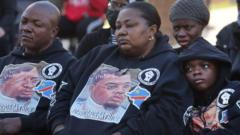As Prime Minister Benjamin Netanyahu prepares to dismiss the head of Israel's Shin Bet intelligence agency, Ronen Bar, public protests are intensifying against the move. Critics assert that this dismissal highlights a troubling trend towards undermining democratic oversight amidst a volatile military campaign in Gaza.
Netanyahu's Anticipated Dismissal of Shin Bet Chief Sparks Public Outcry

Netanyahu's Anticipated Dismissal of Shin Bet Chief Sparks Public Outcry
Israel's Prime Minister faces backlash as protests erupt over the expected firing of the intelligence head amid ongoing military operations.
In a significant political development, Israeli Prime Minister Benjamin Netanyahu is poised to officially dismiss Shin Bet chief Ronen Bar, a decision expected to be voted on by the cabinet on Thursday night. This comes amid increasing public demonstrations against the move, which protesters argue reflects an attempt by Netanyahu's far-right coalition to consolidate power and minimize checks on government authority. Bar has led Shin Bet since 2021 and is crucial in Israel's fight against Hamas, especially as military actions in Gaza escalate.
Needing to oust Bar due to a reported lack of personal trust, Netanyahu's decision raises alarms among many Israelis regarding the future of their democracy. Critics assert that the dismissal indicates an alarming shift towards loyalty over competence for key positions within the government. Bar publicly responded to Netanyahu’s claims of distrust last week, asserting that personal loyalty cannot supersede the public interest and the agency's commitment to safeguarding democracy.
This situation unfolds during a tense backdrop where military operations in Gaza create uncertainty about hostages and the region's stability, adding to the stakes in this political fight. As protests continue, the implications of Netanyahu’s decision could have lasting ramifications on Israel’s democratic framework and public trust in its institutions.
Needing to oust Bar due to a reported lack of personal trust, Netanyahu's decision raises alarms among many Israelis regarding the future of their democracy. Critics assert that the dismissal indicates an alarming shift towards loyalty over competence for key positions within the government. Bar publicly responded to Netanyahu’s claims of distrust last week, asserting that personal loyalty cannot supersede the public interest and the agency's commitment to safeguarding democracy.
This situation unfolds during a tense backdrop where military operations in Gaza create uncertainty about hostages and the region's stability, adding to the stakes in this political fight. As protests continue, the implications of Netanyahu’s decision could have lasting ramifications on Israel’s democratic framework and public trust in its institutions.



















